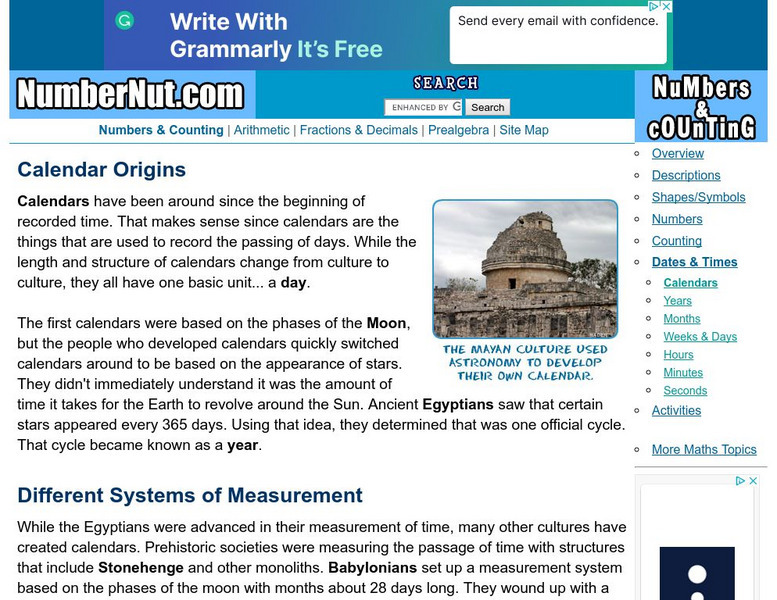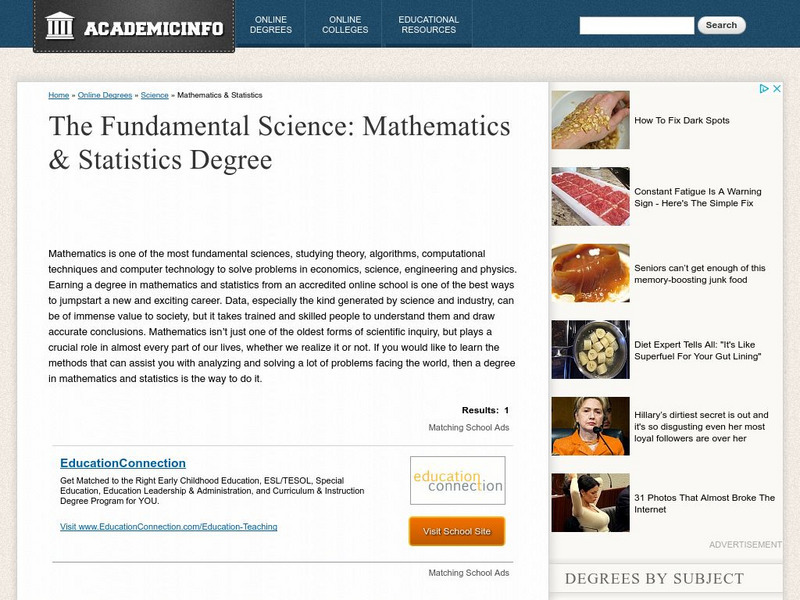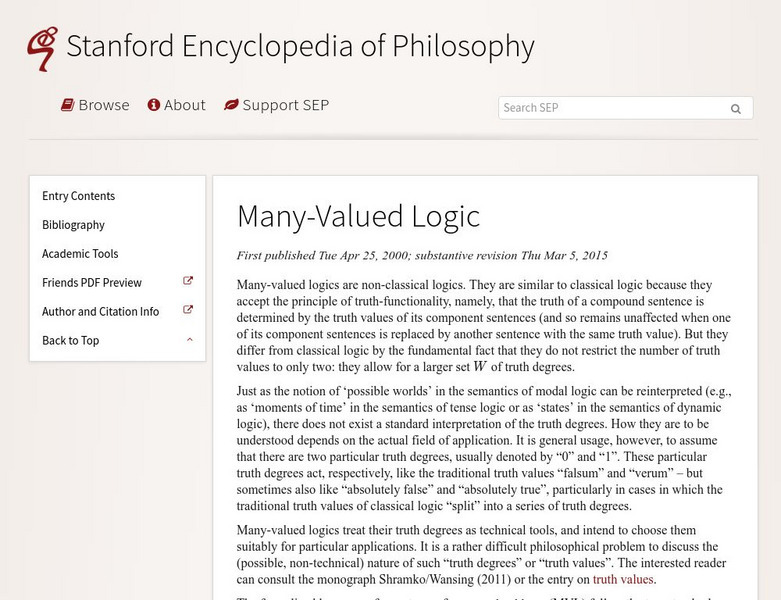Hi, what do you want to do?
Famous Scientists
Famous Scientists: Aristotle
A detailed biography of Aristotle (384-322 BC). Discusses his early life, his education, his relationship with Alexander the Great as tutor, the breadth of his work in various science disciplines, the school he established in Athens, and...
NumberNut
Number Nut: Calendar Origins
History and mathematics merge in this lesson that explores the origin of the calendar. Learn how it all got started in this detailed lesson that includes a simple months of the year game and a more challenging time conversion game. Both...
NumberNut
Number Nut: Week and Weekends
Learn about the origins of a week in this integrated lesson. This lesson explores scientific theories and mathematical facts that are the basis for the time period that we call a week. Included in this lesson are two related, interactive...
Other
Academic Info: Mathematics Gateway
This site provides a comprehensive index and general directory to math sites that will help students in the study of circles.
Curated OER
University of St Andrews: Emmy Amalie Noether
The School of Mathematics and Statistics of St. Andrew's University provides biographical information on the mathematical career of Emmy Noether. Included are links to other famous individuals with whom she worked and links to her topics...
Curated OER
University of St Andrews: Thomas Harriot
The School of Mathematics and Statistics of St. Andrew's University provides biographical information on the mathematical career of Thomas Harriot. Included are links to other famous individuals with whom he worked and links to his...
Curated OER
University of St Andrews: Gabriel Cramer
From the University of St. Andrews MacTutor History of Mathematics Biographies comes this detailed life of Gabriel Cramer (1704-1752 CE), 18th century mathematician credited with "Cramer's Rule," though "Cramer was certainly not the...
Curated OER
University of St Andrews: Johannes Kepler
A biographical account of the life of Johannes Kepler. Discusses his background, as well as his achievements in the field of mathematics.
Curated OER
University of St Andrews: Luther Pfahler Eisenhart
The School of Mathematics and Statics at the University of St. Andrews, Scotland, presents this article on the life and work of Luther Eisenhart (1876-1965 CE). Eisenhart, an American mathematician who lived well into the 20th century,...
Wikimedia
Wikipedia: Brownian Motion
Wikipedia provides detailed information on the two meanings of the term, Brownian Motion. Includes many hyperlinked terms.
Discovering Egypt
Mark Millmore's Ancient Egypt
This site provides a captivating tour through Egypt's past. Visit the ancient temples, the kings and queens of the past. Learn about the hieroglyphic form of communication. Additional links for extended information temples and hieroglyphs.
Alabama Learning Exchange
Alex: Operation to Exploration
Students will use solve mathematical expressions using the order of operations to find artifacts of American History. Students will complete order of operation problems, which will help them explore and solve the route to their final...
Other
Ancient Greek Number Codes
Credited to the Cornell University Greek Epigraphy Project, the content on this page explains (and illustrates through a chart) the Greek use of Alpha characters for numbers.
National High Magnetic Field Laboratory
Magnet Academy: Andre Marie Ampere
Although he was not the first person to observe a connection between electricity and magnetism, Andre-Marie Ampere was the first scientist to attempt to theoretically explain and mathematically describe the phenomenon. His contributions...
National High Magnetic Field Laboratory
Magnet Academy: Julian Schwinger
Theoretical physicist Julian Schwinger used the mathematical process of renormalization to rid the quantum field theory developed by Paul Dirac of serious incongruities with experimental observations that had nearly prompted the...
National High Magnetic Field Laboratory
Magnet Academy: Sin Itiro Tomonaga
Japanese theoretical physicist Sin-Itiro Tomonaga resolved key problems with the theory of quantum electrodynamics (QED) developed by Paul Dirac in the late 1920s through the use of a mathematical technique he referred to as...
Curated OER
Tour Egypt: The Ancient Egyptian Number System
This Tour Egypt site presents an easy-to-read account of ancient Egypt mathematics. Content explores the history and development of mathematics, how it was used, what helpful documents we have found that give us insight into what the...
Curated OER
Picture of Thales
Contains a detailed biography and discussion of the contributions of the ancient Greek philosopher Thales. Part of a larger mathematics site, this page focuses primarily on his contributions to Geometry.
Stanford University
Many Valued Logic/stanford Encyclopedia of Philosophy
Explains the logical theory of "many-valued logic," a modern alternative to classic logic. Sections address its history, notation and proofs, and applications to linguistics, mathematics, philosophy, and artificial intelligence. For the...
Other
Teach With Movies: Lesson Plans Based on Shorts and Clips
Links to many video-clip based lessons in the areas of health, English language arts & drama, mathematics, music, biology, earth science, inventions, astronomy, physics, chemistry, U.S. history and culture, and world history and...
University of California
Uc Irvine: Egyptian Fractions
An introduction to the way the ancient Egyptians wrote fractions, along with a more sophisticated look at the process of converting modern fractions to Egyptian form. Contains a very informative and interesting group of related links,...
Jim Loy
Jim Loy's Website: Egyptian Numbers
Here you can find a general overview of the ancient Egyptian number system. The site compares the ancient symbols to those of modern day numerals. More detailed information can be found from the bottom of the page dealing with Egyptian...
Instituto Latinoamericano de la Comunicacion Educativa
Red Escolar: Mathemata
Learn a little history of Pythagoras of Samos and the relationship between numbers and their divisors.
















